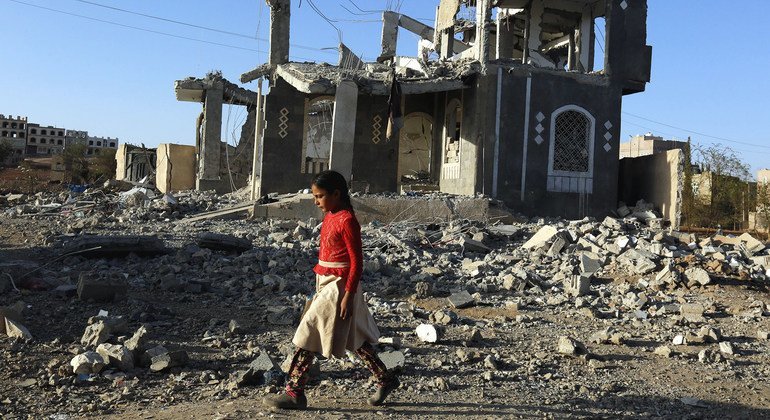UN reiterates call for release of staff detained in Yemen

Hans Grundberg, Special Envoy of the Secretary-General for Yemen and Lisa Doughten from the UN Office of Humanitarian Affairs, OCHAmade the appeal in separate press conferences with ambassadors.
Public space is shrinking
“In four days, on August 19, we will celebrate World Humanitarian Day,” Mr. Grundberg speak“However, in Yemen, we are facing Ansar Allah’s suppression of humanitarian and civil space.”
More than 60 people have been detained, all of them Yemeni nationals and including one of his staff members. In addition, four other staff members from the UN human rights office, OHCHRand its cultural institutions, UNESCOhave been held since 2021 and 2023 respectively.
Ansar Allah – commonly known as the Houthi movement – also closed the OHCHR office in the capital Sana’a on July 29 and ordered international staff to leave.
The Houthis control much of Yemen after rebelling against the internationally recognised government and fighting a Saudi-led coalition in support of the regime since 2015, after seizing the capital the previous year.
A UN-brokered ceasefire expired in 2022 but full-scale fighting has yet to return.
‘An ominous signal’
Earlier this week, human rights chief Volker Türk speak Ansar Allah forces broke into the UN headquarters on August 3, seizing documents, furniture, vehicles and office keys.
“This is an ominous signal about the broader direction Ansar Allah is taking and represents a serious attack on the United Nations’ ability to carry out its mandate.”, Mr. Grundberg told the Council.
“Therefore, I call on Ansar Allah to act responsibly and compassionately. to our fellow countrymen and women and to immediately and unconditionally release all United Nations personnel, non-governmental organizations, civil society, diplomatic missions and the private sector as well as members of religious minorities, and to refrain from further arbitrary detention.”
Impact of regional escalation
Turning to the broader region, the Special Envoy noted that “the Middle East is currently holding its breath” as developments surrounding the war in Gaza drag in other countries, including Yemen. He expressed hope that this “escalatory trajectory” could be reversed.
Despite serious efforts to protect Yemen from escalation, Ansar Allah continues to attack ships traveling in the Red Sea, while the United States and the United Kingdom continue to attack military targets in Ansar Allah-controlled territory in response, he said.
“This situation has lasted for more than eight months now and cannot last any longer.“, he warned.
Shifting focus back to Yemen
The regional escalation also comes at a time when real and urgent challenges inside Yemen need to be addressed, Mr. Grundberg said.
For nearly a decade, the Houthis have been fighting the Yemeni government army and its allies, a conflict that has claimed hundreds of thousands of lives, weakened the social fabric and undermined the delivery of public services.
As a result, Yemen is more vulnerable to natural disasters, environmental hazards and disease outbreaks. severe flooding this week In some provinces, cholera outbreaks continue.
“Therefore, I, once again, call on the Yemeni parties, and especially Ansar Allah, to give priority to the Yemeni people.. Your responsibility is first and foremost in Yemen. We need to shift our focus back to Yemen and find solutions to Yemen’s problems,” he said.
Military exercises continue
Mr. Grundberg reminded the Council that he had repeatedly voiced his deep concern about the course of events in Yemen in recent months and that “unfortunately, this retrograde trend, manifested by continued military operations and escalatory rhetoric, continues.”
Although violence along the frontlines remains relatively contained compared to the period before the UN-brokered ceasefire, “We continue to see military buildup and preparation. “accompanied by constant threats of a return to war,” he said, pointing to clashes in six provinces.
Despite the “bleak picture”, the warring parties halted a dangerous cycle of escalation by reaching a deal last month, with support from Saudi Arabia, ensuring the operations of Yemenia Airlines, the national airline, and continued access to international banking services for the country’s largest banks.
“However, The burden now lies on the parties not only to act in good faith but also to fully implement the commitments they have made.but also to turn that understanding into something that improves the lives and livelihoods of all Yemenis,” he said.
Humanitarianism is facing constraints
Ms. Doughten, OCHA’s Director of Finance and Partnerships, also addressed the ongoing detention of UN and other staff, urge member states “to use whatever influence and leverage they have” to support efforts to secure their release.
She also highlighted the “worrying deterioration in the operating environment in Houthi-controlled areas”, where the situation is becoming increasingly difficult at a time when humanitarian organisations are struggling to meet the needs of millions of people across the country.
Recent heavy rains and flash floods have affected some 69,500 families, killing 98 people and injuring more than 600. Humanitarian organizations have provided immediate life-saving assistance, but a lack of funding continues to hamper their efforts.
$2.7 billion Humanitarian Response Planlaunched in February to support more than 11 million people this year, is only 27 percent funded.
Families are hungry
Meanwhile, food security continues to deteriorate in Yemen, where 60 percent of surveyed households do not have enough food.
Severe food shortages have doubled in the past year in Houthi-controlled areas, from 17% to 36%. The rate has also risen sharply in government-controlled areas, where the rate is 32%.
The impacts of rising food insecurity and malnutrition are not limited to hunger, as they put children, especially girls, at greater risk of abuse and neglect, said Ms Doughten.
“Today, an alarming 30 percent of girls in Yemen are forced to marry before the age of 18 because their families have difficulty providing for them,” she said.
“And the number of children out of school – currently at a staggering 4.5 million – is likely to rise as more children are forced to drop out of school to help support their families.”

Food-insecure families in Lahj, Yemen receive cash assistance from WFP to help them meet their food needs.
Preventing ‘potential disaster’
She said the United Nations World Food Programme (World Food Programme) is planning a one-off distribution to counter the impact of the recent suspension of general food distribution in Houthi-controlled areas. The goal is to reach more than 1.6 million people in 34 of the worst-affected districts.
“However, as the overall food insecurity situation continues to worsen across the country, we need to act more forcefully to prevent another potential disaster,” she said.
“Fully and urgently funding the Humanitarian Response Plan for Yemen is the minimum requirement for these and other critical humanitarian needs.”




